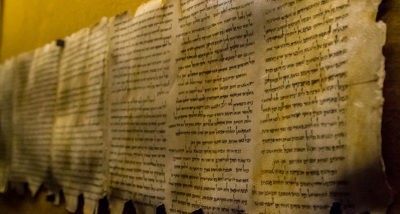– José Mario O Mandía
On 30 September 1943, Pope Pius XII issued the Encyclical “Divino afflante Spiritu” (“Inspired by the Holy Spirit”) which welcomed the use of textual criticism to examine not only the contents of the Bible but the authorship, dating, and other such technical details of each of the sacred books.
On 18 November 1965, Pope St Paul VI promulgated the Dogmatic Constitution on Divine Revelation “Dei Verbum” (DV). The document (no 12) confirmed the need to use the historical-critical method. Why? Because when Jesus Christ became man, he entered human history. As Pope Benedict XVI said, “The history of salvation is not mythology but rather true history, and is therefore to be studied alongside serious historical research methods” (Address to Bishops, 14 October 2008).
As we have already seen in Bite-Size Theology (20), the CCC (no 110) has reiterated the importance of the historical-critical method.
Dei Verbum stressed, however, that historical-critical interpretation does not suffice. Again, in Bite-Size Theology (20) we have seen that the CCC (no 111) recalled this point as well: “‘Sacred Scripture must be read and interpreted in the light of the same Spirit by whom it was written’ (DV 12).” It likewise explained the consequent three-fold criteria for correct Biblical interpretation (CCC 112). The first of these criteria – taking into account the unity of Scripture (the Bible does not contradict itself) – is called “canonical exegesis.” Pope Benedict XVI pointed out in Jesus of Nazareth. From the Baptism to the Transfiguration that canonical exegesis was developed by American scholars “to read individual texts within the totality of the one Scripture, which then sheds new light on all the individual texts.”
This method arises from faith, and not from human science. We can call it “theological method.” It is important to use it hand in hand with the historical-critical method. Pope Benedict XVI stated in the aforementioned address, “Only where the two methodological levels, both historical-critical and theological, are observed can one speak of theological exegesis, of an exegesis adequate to this Book.”
What is the present state of biblical exegesis? Benedict describes it in the same talk. “While at the first level, academic exegetical work is currently being done to an extremely high standard and provides us real help, the same cannot be said of the other level. Often this second level, the level consisting of the three theological elements mentioned in Dei Verbum, appear almost absent. And this has rather grave consequences.”
Then he proceeds to describe those consequences.
“The first consequence of the absence of this second methodological level is that the Bible becomes solely a history book. Moral consequences can be drawn from it, history can be learned from it, but the Book as such speaks of history alone and exegesis is no longer truly theological but instead becomes purely historiographical, literary history. This is the first consequence: the Bible remains in the past, speaks only of the past.
“The second consequence is even graver: where the hermeneutics of faith explained in Dei Verbum disappear, another type of hermeneutics will appear by necessity a hermeneutics that is secularist, positivist, the key fundamental of which is the conviction that the Divine does not appear in human history. According to this hermeneutics, when there seems to be a divine element, the source of that impression must be explained, thus reducing everything to the human element. As a result, it is the grounds for interpretations that deny the historicity of divine elements. Today the exegetical ‘mainstream’ in Germany, for example, denies that the Lord instituted the Holy Eucharist and says that Jesus’ corpse remained in the tomb. The Resurrection in this view would not have been a historical event but a theological view. This happens because the hermeneutics of faith is missing: profane philosophical hermeneutics is affirmed instead, which deny the possibility of the entrance and presence of the Divine in history.”


 Follow
Follow


